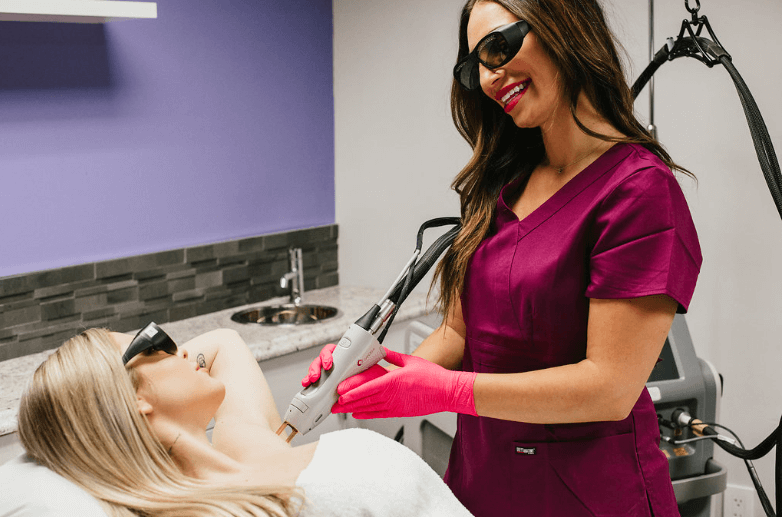
How Much Should I Tip My Laser Hair Removal Technician
Laser hair removal technicians are in charge of using laser treatments to remove unwanted body hair. They perform these services for clients who want to get rid of hair on their legs, underarms, and other parts of their bodies. Laser hair removal technicians must be skilled at using a laser treatment machine and must also have a good understanding of the safety requirements for operating such machinery.
The first step in becoming a laser hair removal technician is to earn an associates degree from an accredited school. Most states require that you be licensed before you can work as a laser technician, so it’s important to check with your state’s Board of Cosmetology before enrolling in training programs.
A degree program in this field typically covers topics such as anatomy, physiology, and biology; chemistry; physics; and medical terminology. In addition to these core courses, students will also take electives related specifically to lasers and their uses in medicine and beauty care.
In this blog, we’ll consider how much do you tip a laser technician and laser hair removal etiquette.
If you’re interested in beauty, healthcare and wellness, you may want to consider a career as a laser hair removal technician. This may be a good option for people who enjoy skin care and cosmetic-related tasks. Understanding specific details about the job of a laser hair removal technician can help you decide if this is the right career path for you. In this article, we describe what a laser hair removal technician is, how to become a laser hair removal technician and the typical job duties, education, skills and work environment of a laser hair removal technician.

What is a laser hair removal technician?
A laser hair removal technician is a beauty professional who specializes in laser hair removal techniques. Laser hair removal technicians are client-facing professionals who provide cosmetic and health-related services to enhance a person’s appearance. With this specialized skill set, laser hair removal technicians provide safe and professional hair removal services to clients in a variety of settings.
What does a laser hair removal technician do?
A laser hair removal technician uses a light beam treatment to damage a client’s hair follicles so that the hair does not continue to grow. This process includes pretreatment preparation, procedure execution and post-treatment client care. Specific responsibilities may vary between jobs but typically include:
- Conducting a pretreatment consultation to understand a client’s needs and objectives
- Providing pretreatment and post-treatment instructions to help clients prepare for a safe and successful procedure and recover as expected
- Cleaning, preparing and sanitizing equipment to ensure a sterile and safe experience
- Implementing one or more rounds of hair removal treatment by selecting the laser instrument, preparing the skin and applying the light to the follicles in accordance with industry regulations
- Maintaining awareness of health and safety protocols and evolving best practices in the field to ensure high-quality service delivery
- Consulting with estheticians or medical professionals to deepen knowledge and identify treatment solutions for unique client needs
How to become a laser hair removal technician
Becoming a laser hair removal technician requires a combination of education, certification, licensure and related work experience. There are no federal laws governing this industry, so the exact education and certification requirements vary by location. Regardless of the specific job you want, you can follow these five steps to become a laser hair removal technician:
1. Research the certification requirements
The first step to becoming a laser hair removal technician is to research the education, certification and licensure requirements in the state where you plan to work. You can find this information by contacting your state’s cosmetology or medical boards or by visiting websites of leading cosmetology organizations. You can also contact cosmetology schools or esthetician programs in your area to verify the requirements.
2. Pursue education
There are several education options for developing the skills necessary to be successful as a laser hair removal technician. The most comprehensive option is an esthetician or master cosmetologist program, as these programs include laser hair removal as one area of a broader curriculum. Another option is to complete a laser hair removal certification program that requires a set number of classroom hours and clinical practice requirements. In Arizona, for example, technicians must complete 40 classroom hours, 24 clinical practice hours in laser hair removal and 24 additional hours in alternative light-based treatments.
Regardless of the exact program, the most important requirement is that you have the necessary skills to perform hair removal procedures safely and professionally. As part of your coursework, you learn about hair removal techniques, safety protocols, machine and equipment maintenance and client assessment. Most programs include a combination of classwork and training at an accredited institution.
3. Obtain national certification
Even if it is not required in your state, earning a national certification can strengthen your skills, increase your preparedness and enhance your marketability with prospective employers. The most recognized industry certification is the Certified Professional Electrologist (CPE) designation from the American Electrology Association (AEA). You can earn this certification by passing the CPE exam, which is offered annually at the AEA convention.
Four additional certifications are available through the Society for Clinical and Medical Hair Removal, including:
- Certified Clinical Electrologist
- Certified Medical Electrologist
- Certified Laser Hair Removal Professional
- Certified Pulse Light Hair Removal Professional
4. Apply for a state license
In addition to education and certification, many states also require laser hair removal technicians to obtain a laser technician state license. You can earn this license by passing both the NIC National Electrology Theory and Practical Examinations from the National Interstate Council of State Boards of Cosmetology. You can increase your chances of success on the exam by participating in preparation courses and completing practice exams.
5. Gain relevant experience
You can prepare to become a laser hair removal technician by working in an esthetician’s office or related cosmetology facility. Through this, you can develop your skills and create a client base. You can include this experience on your resume and list your employer as a professional reference.
Average salary of a laser hair removal technician
Laser hair removal technicians can be full-time salaried employees or hourly wage employees, depending on their work environment. The average annual salary for a laser technician is $55,947 per year. They are considered skin care specialists, and the U.S. Bureau of Labor Statistics projects employment opportunities for this occupation to grow 17% by 2029, which is significantly faster than most occupations.
Skills for a laser hair removal technician
Laser hair removal technicians require a combination of technical and interpersonal skills to be successful, also referred to as hard and soft skills. This includes skills obtained during education and certification programs and skills you refine as you gain work experience. The most important skills for a laser hair removal technician to have include:
Attention to detail
This skill involves the ability to understand and attend to information such as hair removal procedures, safety guidelines and client needs to ensure high-quality work. Laser hair removal technicians are attentive when identifying characteristics of a client’s skin, determining the most appropriate laser instrument, observing treatment efficacy throughout procedures, monitoring post-treatment progress and complying with industry regulations. Attention to detail is especially important during treatment to ensure the health and safety of clients.
Communication
This skill involves the ability to clearly and effectively convey information to other people. Using primarily verbal communication, laser hair removal technicians explain procedures, answer questions, provide recommendations and schedule appointments. An important component of this is being able to explain things to clients in easy-to-understand, nontechnical language.
Confidence
This skill involves presenting yourself as competent and capable of meeting the requirements of a given situation. Laser hair removal technicians use this skill by presenting themselves as confident to clients in order to ensure that clients are comfortable participating in a treatment. This is important in any service industry, especially one where health and safety are involved. You can communicate confidence by speaking clearly, answering questions, providing detailed answers and remaining calm under pressure.
Work environment for a laser hair removal technician
Laser hair removal technicians work across a variety of settings including salons, spas, doctor’s offices and plastic surgery facilities. They may work any day of the week, during traditional business hours and possibly evening hours as well. If working independently with private clients, they may have a less traditional work schedule and perform services at the request of the clients. This job requires technicians to stand for much of the day, move around often and operate laser equipment.
Should you tip for laser hair removal?
The answer is YES, you should tip for laser hair removal, but it is not mandatory.
Hair removal treatments are medical procedures, so if you feel that they have offered exceptional service or gone out of their way to include other services not paid for, you can tip them.
Give them what you feel like giving without having to calculate a certain percentage.
When tipping becomes mandatory, it stops being a tip but an additional charge of the service.
How much to tip laser hair removal?
This is optional too. It depends on where you use the services.
Some small areas will cost you $10-$20, and a medium area will cost you $20-$50, while a large area will cost you $50-$80.
So if you are satisfied with the services, typically, you should tip 10-20% of the original price. And if you get such a costly service like $1000-$2000, then 5%-10% is enough.
3 appropriate ways to tip a hair removal technician
Noticing the sign
Many laser centers usually alert their clients if tipping is expected or not.
To help you not feel obliged to tip if you don’t want to, they put up notices stating clearly that you are not required to tip.
If the laser center accepts tipping, it will advertise the fact that tipping is not included in the treatments.
Asking receptionists or workers
Don’t be afraid to ask the receptionist what the tipping etiquette is when you book an appointment.
It might feel awkward at the time, but it’s better than embarrassing yourself (and the technician) at the time of payment.
Asking friends and family who have undergone laser hair removal
Since they have firsthand experience, they will be in an excellent position to tell you whether or not tipping is required at the particular laser center where you are going to visit.
Is laser hair removal permanent?
In short, no. Laser hair removal works by heating the hair follicles to stop new hairs from growing.
This puts the hair follicles in a state of dormancy for an extended time — much longer than with shaving and waxing.
When the hairs grow back, they’ll be lighter, more delicate, and fewer in number.
This is the best way to prepare for laser hair removal
You should shave the treatment area entirely before treatment. Your legs should be shaved no sooner than 24 hours before your appointment to avoid irritation.
Do not wax, tweeze, epilate, or use chemical depilatories between laser treatments.
Laser Hair Removal Etiquette
Pain after treatment can be reduced by avoiding tight or restrictive clothing.
Skin in the treatment area should be cleansed the morning of treatment. Please refrain from applying any additional lotions or creams, including deodorant, as these will need to be removed before treatment can begin.
Conclusion
Tipping for the laser hair removal treatment is common, but not mandatory.
Just tip them when you want to tip as the service is beyond satisfaction, for example.
But before you do that, feel free to ask the receptionist or your experienced friends in advance to avoid awkwardness between you and the technician.
We hope that with the information we’ve just given, you can have the best preparation to make your hair treatment go smoothly.

